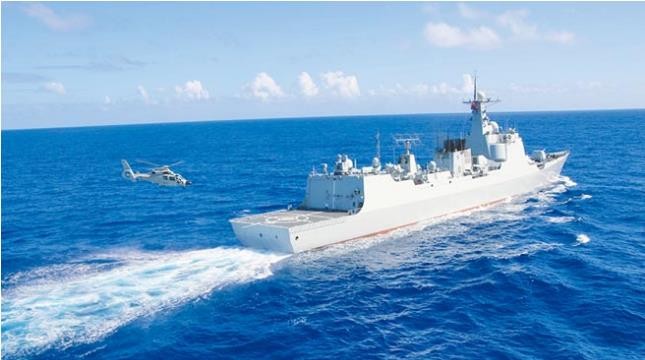
AP reports that Chinese planes and ships held war games in the Sea of Japan last week, the military said, during which Beijing displayed its latest-generation frigate at a time of bitter territorial disputes with Asian neighbors. The Defense Ministry said in a statement on its website late Saturday that the long-range exercises staged Friday pitted a red army against a blue one in a simulated bomber attack on a naval task force. It quoted the commander of an unidentified flight wing under the East Sea Fleet, Zhang Wenzhong, as saying the planes found, identified and struck their targets in a "radically short time." The statement made no mention of what sort of conflict the exercise was intended as a response to, prospective foes or why the Sea of Japan was chosen as the location of the drills. However, China has grown increasingly assertive over its claim to a chain of uninhabited islands controlled by Japan, recently dispatching more than a dozen coast guard vessels as Chinese fishing vessels swarmed the surrounding waters.
Bloomberg writes that Cracks are starting to show in China's labor market as struggling industrial firms leave millions of workers in flux. While official jobless numbers haven't budged, the underemployment rate has jumped to more than 5 percent from near zero in 2010, according to Bai Peiwei, an economics professor at Xiamen University. Bai estimates the rate may be 10 percent in industries with excess capacity, such as unprofitable steel mills and coal mines that have slashed pay, reduced shifts and required unpaid leave. Many state-owned firms battling overcapacity favor putting workers in a holding pattern to avoid mass layoffs that risk fueling social unrest. While that helps airbrush the appearance of duress, it also slows the shift of workers to services jobs, where labor demand remains more solid in China's shifting economy. "Underemployment in overcapacity industries is a drag on the potential improvement of productivity in China, which will lead to a softening wage trend," said Grace Ng, a senior China economist at JPMorgan Chase & Co. in Hong Kong. "It would exert pressure on private consumption demand and in turn affect the overall rebalancing of the economy."
Financial Times reports that China's tolerance for polluting vehicles — the market is dominated by cars powered by petrol engines — is now drawing to an end. A rollout of new legislation due to be completed by 2020 aims to tighten China's rules on cars' emissions and fuel economy, bringing them into line with western countries and thereby curbing the industry's contribution to global warming and air pollution. The legislation is expected by some analysts to hit the profits of companies operating in what is the world's largest automobile market, but VW and other overseas carmakers are better placed than their domestic rivals to cope with China's shift to stricter standards, says Jane Lewis, analyst at Macquarie. "The domestic brands are hit disproportionately as international brands face similar emission and fuel economy requirements in other markets," she adds. Some overseas carmakers, such as Jaguar Land Rover, may struggle to meet fuel economy targets set by the Chinese government for their fleets but most international brands will reach these goals, says Ms Lewis. The worst hit will be smaller domestic carmakers, she adds.
- 2016-08-19 Rio 2016: China Rethinks Gold Medal Pursuit at Olympics
- 2016-08-18 China’s Pollution Deaths to Linger After Air Clears, Study Finds
- 2016-08-17 China, ASEAN aim to complete framework of South China Sea rules next year
- 2016-08-16 UK’s May reassures China after nuclear power plant delay
- 2016-08-15 China says no South China Sea at G-20, US urges transparency
- 2016-08-14 China to use tougher environmental standards to tackle capacity glut
- 2016-08-12 How the China Shock, Deep and Swift, Spurred the Rise of Trump
- 2016-08-11 Here’s how the South China Sea ruling affects U.S. interests
- 2016-08-10 Exclusive: Vietnam moves new rocket launchers into disputed South China Sea - sources
- 2016-08-09 China’s Limited Retaliation Options Against the THAAD Deployment in South Korea
- New York Times China Helps Aung San Suu Kyi With Peace Talks in Myanmar
- Wall Street Journal US Faces Setback in Asia if TPP Trade Deal Doesn't Pass
- Bloomberg Chinese Tourists in Japan Choose Cosmetics Over Electronics
- Wall Street Journal Chinese-Led Consortium Eyes Liverpool Football Club
- Reuters Team China's chief says poor medal haul exposes problems -media
- Fox News In China, a forgiving public embraces fewer gold medals
- Reuters China's Vanke says confidence hit by takeover battle
- Reuters Hundreds swelter in Hong Kong protests at perceived election meddling
- New York Times China Captures Women's Volleyball Gold, Coach Makes History
- The Washington Post With birthday bash, a baby panda becomes diplomat in US-China relations
- The Guardian California woman sentenced for conspiring to send China military gear
- Reuters Taiwan President says unofficial communication channels remain with China
- CNBC China Selfie App Meitu aims to raise up to $1 billion in HK IPO: WSJ
- Forbes China Sets A "Red Line" For Japan In South China Sea
- Reuters Former China boom town learns hard lessons about service economy
- Forbes Why Is China Building A New City In Georgia?
- Wall Street Journal Deaths of Foxconn Employees Highlight Pressures Faced by China's Factory Workers
- New York Times Q&A: Former Treasury Official Collyns on China's Currency
- Forbes Despite 'Quantum Leap,' China's Innovation Sector In Distress